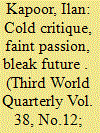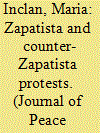|
|
|
Sort Order |
|
|
|
Items / Page
|
|
|
|
|
|
|
| Srl | Item |
| 1 |
ID:
156651


|
|
|
|
|
| Summary/Abstract |
This article carries out a psychoanalytic critique of Post-Development, arguing that the latter’s inattention to the unconscious underpinnings of power not only leaves it unable to explain why development discourse persists, but also deprives it of a radical politics, resulting in a surrender to global capitalism. Drawing on the work of Escobar, Ferguson and Esteva, the article valorises Post-Development’s important insights on the production of development discourse and its attendant power mechanisms. But using a Lacanian lens, it also probes Post-Development’s failure to address how power is mediated at the level of the subject: in maintaining that (capitalist) development is produced discursively in a cold, impersonal way (like an ‘anti-politics machine’), Post-Development ignores the fact that such power is only able to take hold, expand and, crucially, persist through unconscious libidinal attachments (e.g. desires, enjoyment). This failure leaves Post-Development with few resources – beyond localised resistance (Escobar, Esteva) or the call for a universal basic income (Ferguson) – to address the structural challenges of global capitalism. Psychoanalytically speaking, such a (Left) position appears to manifest a secret desire that nothing too much must change: Post-Development may well criticise the disciplinary mechanisms of neoliberal development, but ultimately it engages in an unconscious acceptance of capitalism.
|
|
|
|
|
|
|
|
|
|
|
|
|
|
|
|
| 2 |
ID:
091617


|
|
|
|
|
| Publication |
2009.
|
| Summary/Abstract |
Using negative binomial models, I analyze the effects of repressive threats and procedural concessions on Zapatista protests from 1994 to 2003. Some of the results appear consistent with previous findings in the literature. Repressive threats had a negative initial effect and a positive delayed effect on protest activity and its simultaneous location across cities. However, procedural concessions had statistically insignificant negative initial and delayed effects on protests and their simultaneous location. Also contrary to the literature, when procedural concessions and repressive threats were combined, they had statistically insignificant positive initial and delayed effects on protest activity and its simultaneous location. Finally, democratization changes decreased Zapatista protests in the short and long term and helped to focus mobilization efforts on the remaining closed environments. Thus, democratization openings and an inconsistent use of repressive threats and procedural concessions did not strengthen the development of the movement; they contributed to the movement's relative weakness.
|
|
|
|
|
|
|
|
|
|
|
|
|
|
|
|
| 3 |
ID:
113940


|
|
|
|
|
| Publication |
2012.
|
| Summary/Abstract |
This study represents the first systematic analysis of the interactions between pro-Zapatista and counter-Zapatista protestors in Chiapas, Mexico, and the first empirical test of movement-countermovement theories in a transitional democracy. Three claims are tested: (1) movement protests trigger countermovement protest activity; (2) different political parties at different levels of government trigger movement-countermovement protest activity; and (3) victories won by one side of a conflict, viewed as procedural concessions, trigger further pro- and countermovement protest activity. These hypotheses are tested using negative binomial models and data on Zapatista-related protest activity between 1994 and 2003. The results show that: (1) movement and countermovement protests have a positive, reciprocal effect on both groups' future protest activity; (2) movement and countermovement protesting groups use the dominant political party as a target of protest. The characteristics of the electoral cycle and rise of multi-party competition at all levels of government do not have a consistent effect on protest activity; (3) granting procedural concessions to pro-movement actors generates more protest activity among both groups. However, granting procedural concessions via social programs and public works to the population irrespective of its sympathy to either side of the movement-countermovement conflict decreases movement protests and increases countermovement protests.
|
|
|
|
|
|
|
|
|
|
|
|
|
|
|
|
|
|
|
|
|